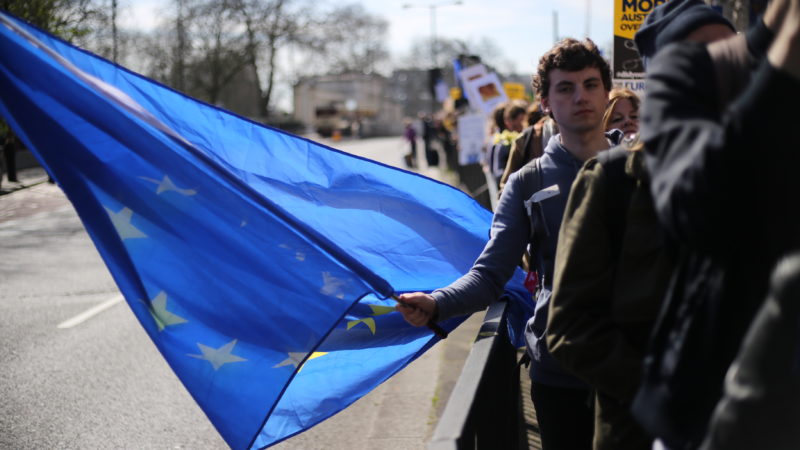Taking these steps now could help us on our path to rejoining the EU – eventually, writes former special adviser Julian Eccles.

Among the strategic objectives of Labour’s new Leader will be establishing the party’s view of Britain’s relationship with Europe in the new era.
Each of the three candidates has said they want Britain to remain close to the EU with varying degrees of enthusiasm and detail. The winner will need a roadmap to bring such embryonic views to life.
In the 1980s, Labour realised it needed to transform its 1983 manifesto commitment that pledged withdrawal from the EEC, to a new policy of engagement. This was done on the grounds both of policy merit and to symbolise its revival as a credible mainstream Party. So its 1987 manifesto proposed “to work constructively with our EEC partners to promote economic expansion and combat unemployment.” Quite a shift in four years.
So what should Labour be saying and doing in the next four years ahead of the 2024 general election?
It will need to be very different to the People’s Vote/ambivalence cocktail served up in 2019. In 2024 Britain may still be in agonising Brexit transition limbo or fully out of the EU with or without a deal. Either way, as part of its overall policy review, Labour will need to determine how it wants Britain to co-operate with its nearest neighbours.
Despite the party’s heart wanting instantly to rejoin the EU, its head should overrule and avoid this temptation. To do so would jar with current political reality and skew a balanced consideration of policy for the mid 20s and beyond.
If, through the study of evidence and discussion, EU co-operation enhances a policy solution then it should flow naturally – not as a primary policy objective. Let’s not engineer an EU solution into everything. Let the facts dictate this as necessary and let the Tories own Brexit and its consequences.
So the policy approach could be based on three core concepts:
1. Recognition that Britain’s economy is highly geared to trade with the EU (in 2018 the EU accounted for 45% of UK exports and 53% of its imports) and is likely to continue to be so
2. Understanding that many policy objectives, from tackling climate change to unscrupulous corporate tax avoidance, require internationally co-ordinated collective action and that
3. Value and learn from the experience of our EU sister parties and other progressives in similar economies in creating Labour’s own policies.
In the 1980s Labour’s Euro switch was partly driven by regular and orchestrated leadership and Shadow Cabinet contact with fellow European socialist parties. They were occasions for sharing policy ideas on common domestic problems and identifying opportunities for intergovernmental action.
It was where the EU Social Chapter was first discussed in Labour circles and how an appreciation of European action on the environment developed. These encounters helped convert a few Labour eurosceptics.
This approach should be adapted and updated now. Despite Brexit, Labour is still a full member of the Party of European Socialists that brings together over 50 left parties from across the EU. At the most senior levels, we should be active within this as well as on a bilateral basis – routinely connecting our leading frontbenchers as well as our policy experts, Mayors, Council leaders and others with their European counterparts to create progressive solutions.
Right now we could be talking to our colleagues in the resurgent PSOE, whose leader Pedro Sànchez now heads the left coalition government in Spain, on topics such as its industrial development plan which aims to promote the decarbonization on the country’s economy over the next decade.
Or we could discuss with the SPD’s Peter Tschentscher, who recently won the Hamburg elections, following its success in steering the city’s economy and boosting affordable housing for its 1.8m people. There are so many opportunities.
In contrast to the Tory Government’s thin presence at the recent Munich Security Conference, lamented by our partners and allies, Labour should seize every opportunity to engage with its counterparts across the continent.
Labour has to chart a path that draws on the European experience and applies it to British circumstances. That is not to say it reheats Remain. Instead its recipe for winning should include radical policy prescriptions that highlight the benefits of European co-operation without being Eurofanatic.
That approach would contrast with the Tories’ hubristic attachment to a mythical “sovereign” British status and their appalling approach to reduced social, environmental and consumer protection whose damaging impact will eventually rebound on them at the ballot box.
Our European work should begin as soon as possible. It should be a key strand within the new Leader’s strategy alongside a thorough Policy Review, party renewal and effective opposition.
By itself it may not lead to victory in 2024. But it would put the party on a course which combines the best of its values – internationalism, collective action and solidarity – with a sharp focus on new solutions for the new era. It could lay the ground, in time, to a potential return to the EU and do so on a rational basis – a far cry from Brexit.
Julian Eccles was a European Policy specialist and general election co-ordinator at Labour HQ in the 1980s/90s and a Government Special Adviser from 1997-98. He was the founding Treasurer of the Centre for European Reform and is a member of Hammersmith CLP.




One Response to “A new European roadmap for Labour”
A new European roadmap for Labour – LeftInsider
[…] Left Foot Forward […]